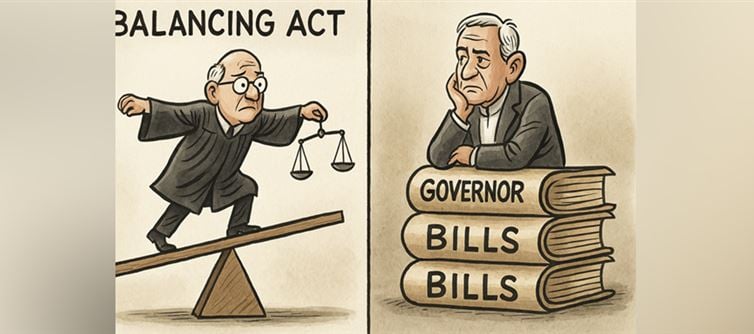
WHEN CONSTITUTIONAL CRISES ARE RESOLVED WITH ‘BALANCING ACTS,’ NOBODY WINS — LEAST OF ALL CITIZENS
India’s supreme court constitution bench delivered a verdict that tries to maintain harmony between the judiciary, the executive, and the constitutional offices of Governors and the President. But in trying not to “rock the boat,” the court ended up doing exactly what it accused Governors of doing — leaving the fate of important state bills suspended in mid-air.
The judgment says:
✔ Governors cannot sit on bills indefinitely
❌ But the court cannot impose timelines
The result? A verdict that sounds wise, feels balanced, but gives zero operational clarity.
Meanwhile, states complain, Governors delay, the Centre shrugs, and citizens wait for governance, legislation, and basic decision-making.
“10 Brutal Truths About the supreme Court’s ‘Balancing Act’ That Leaves Everyone Confused”
1. A Verdict That Says Everything — Except What Needs to Be Said
The court acknowledges the problem.
It highlights the delay.
It calls for constitutional propriety.
And then?
It stops just before giving any actionable guidance.
That’s not balance — that’s institutional hesitation.
2. Governors Can’t Delay Bills Forever — But For How Long? Nobody Knows.
The court says “not indefinitely.”
But what is “indefinite”?
One month? Six months? Two years?
When governance depends on patience instead of process, the Constitution becomes guesswork.
3. Saying ‘We Can’t Interfere’ Is Also Interference — Through Inaction
When Governors are accused of acting as political gatekeepers for the Centre, judicial neutrality without accountability doesn’t strengthen democracy.
It weakens it.
Silence is not neutrality — it’s a vacuum.
4. Citizens Are Stuck Between a governor Who Won’t Act and a court That Won’t Push
Bills are not political toys.
They are laws that affect millions.
But today, they sit frozen between raj Bhavans and courtrooms while people wait for decisions like they’re waiting for a bus in the monsoon.
5. If the court Can’t Set Timelines, At Least It Could Set Guidelines
No one asked the court to police every file.
But even basic principles — like “reasonable time = 30/60/90 days” — would have prevented constitutional delay from becoming constitutional abuse.
6. Democracy Cannot Function on the Governor’s Mood Swings
Governors were intended to be neutral constitutional custodians.
Not part-time political gatekeepers.
When legislation depends on goodwill instead of rules, federalism becomes fiction.
7. The Absence of Clarity Is Now the Biggest Constitutional Loophole
The entire dispute exists because the Constitution never set timelines.
But if institutions won’t clarify, and governors won’t act, the loophole becomes a weapon in political battles between the Centre and states.
8. Courts Often Demand Transparency From Governments — But Avoid Giving It Themselves
Judgments that sound philosophical but deliver no operational solution are becoming a trend.
Democracy doesn’t need poetry.
It needs a process.
9. 'Balance' Is Not the Same as ‘Resolution’
Balance is a diplomatic word.
Resolution is a constitutional duty.
One avoids conflict.
The other solves it.
India today got a balance, not a resolution.
10. The System Needs Reform — Not yoga Poses
Every time institutions avoid decisive positions in the name of “balance,” they dilute their own authority.
India’s constitutional machinery needs:
✔ Clear rules
✔ Clear consequences
✔ Clear timelines
Not soft landings and philosophical paragraphs.
💥 CONCLUSION:
INDIA DOESN’T NEED A BALANCING ACT — IT NEEDS INSTITUTIONAL COURAGE
The supreme Court’s verdict may preserve harmony today, but it does little to prevent the constitutional dysfunction that made this case necessary in the first place.
Governors delaying bills is not a technical issue — it’s a governance crisis.
When constitutional offices play politics, and courts refuse to specify boundaries, the entire democratic chain weakens.
Citizens deserve laws, decisions, timelines — not endless silence wrapped in balance.




 click and follow Indiaherald WhatsApp channel
click and follow Indiaherald WhatsApp channel